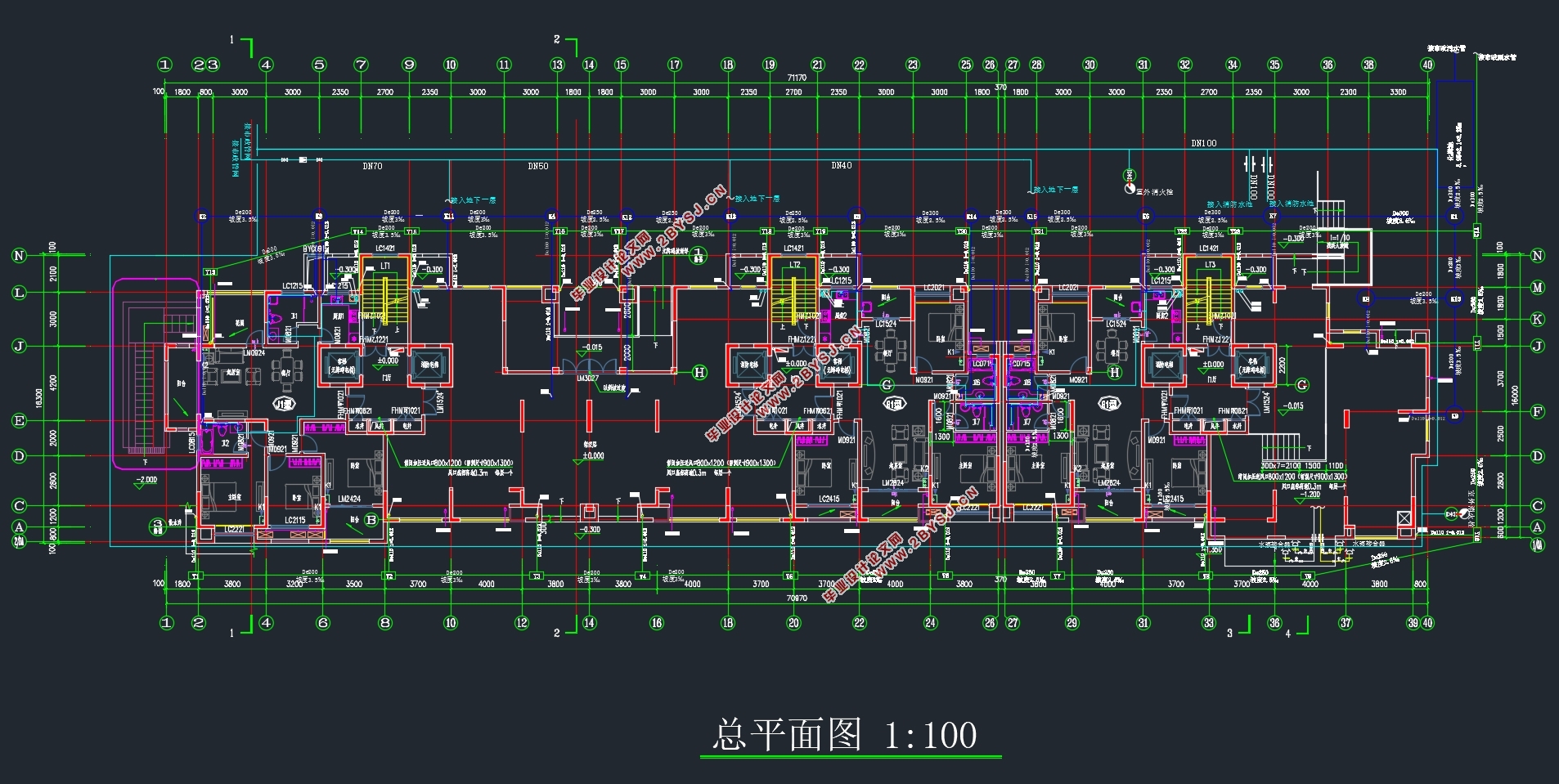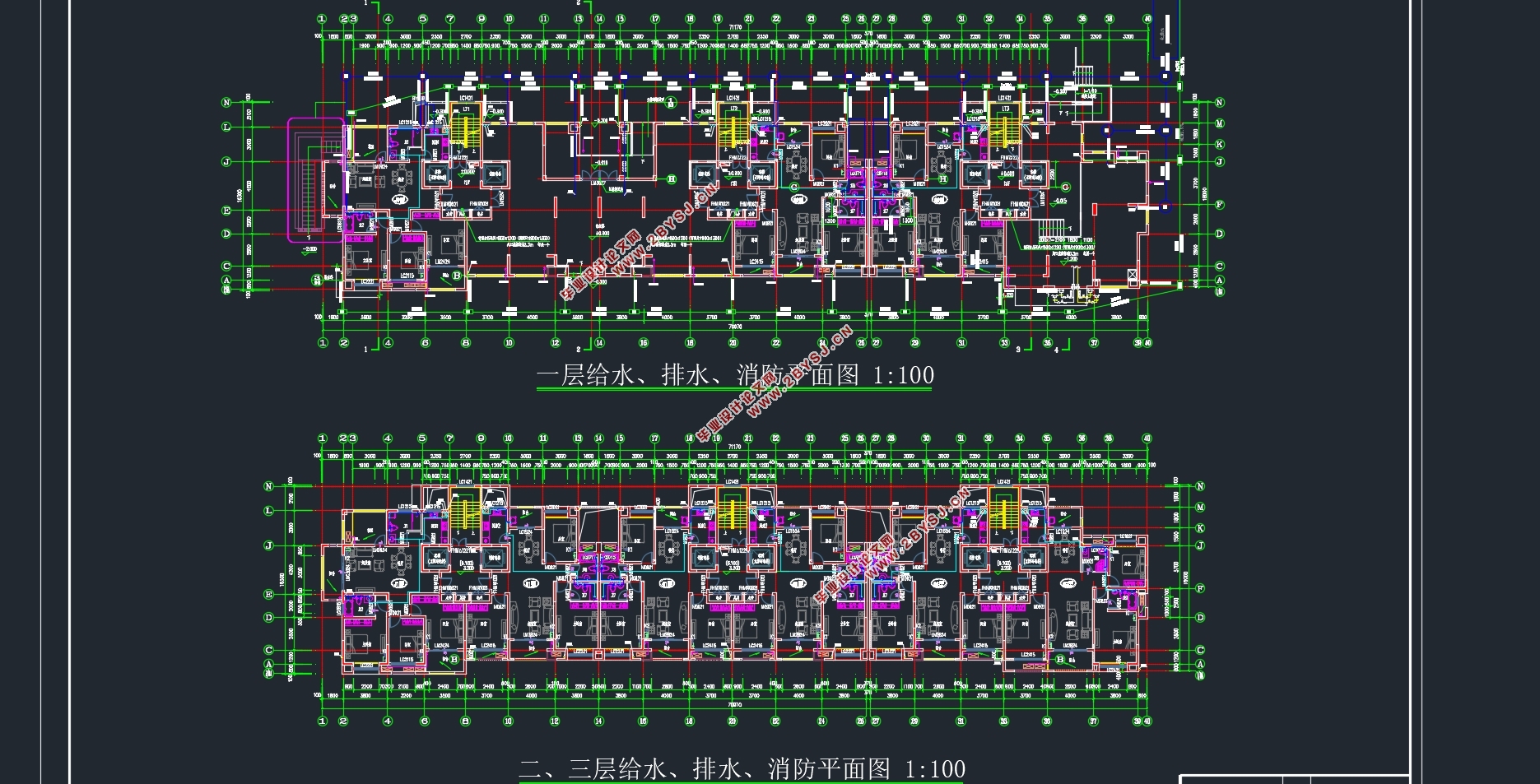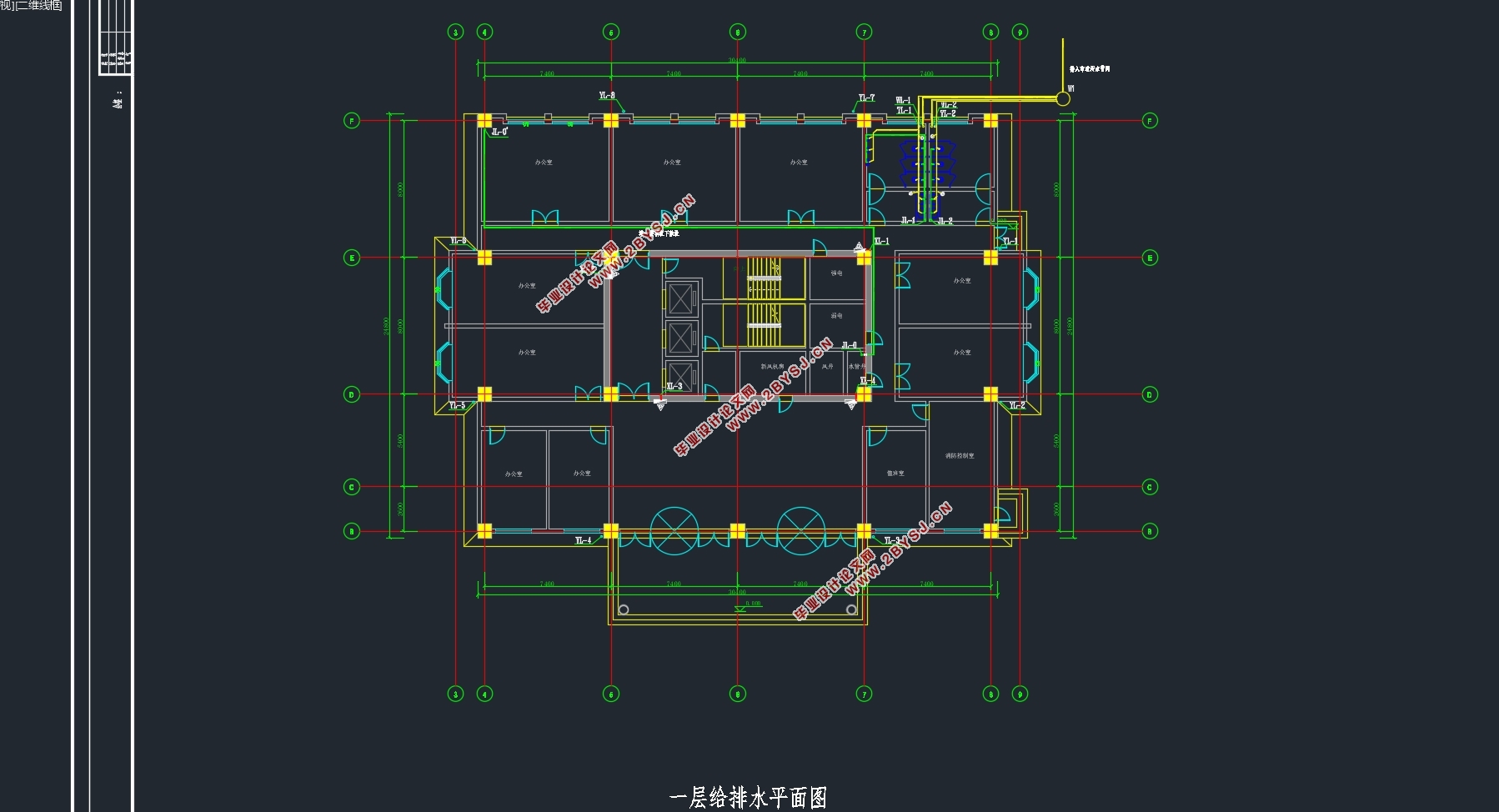某高层住宅楼建筑给排水设计(附CAD图)
无需注册登录,支付后按照提示操作即可获取该资料.
某高层住宅楼建筑给排水设计(附CAD图)(任务书,开题报告,外文翻译,论文计算书12000字,CAD图16张)
摘 要
在本设计中,地下室至地上四层是由市政管网直供,五至十六层采用变频泵供水的给水方式。直供部分从市政给水管网接一根DN75的引入管,两根DN100的引入管接至地下一层消防水池。生活水池和消防水池为砖砌混凝土结构,置于地下室。室内排水厨房、卫生间分开排水,室外采用生活污、废水合流制。设立专用通气立管。泵房排水槽经汇集排至地下一层污水井,经潜污泵提升排至检查井再经过化粪池处理后排入市政排水管。屋面雨水排放采用重力式雨水系统,雨水经屋面雨水斗收集后由雨水管排至检查井。
根据规范,该建筑是一类建筑,属中度危险一级,地下车库属于中度危险二级。室内消防流量是30L/s,室外消防流量是20L/s。充实水柱取12m,水龙带长度取25m,水枪喷嘴流量是5L/s,消防立管管径是DN150,在顶层设试验消火栓一个。
该建筑采用湿式自动喷淋灭火系统,报警阀设于地下一层,设水流指示器、末端试水装置和信号阀,其信号均送入消防控制中心进行处理。屋顶水箱为18立方米,贮存10min自动喷水灭火系统、室内消火栓系统用水量。自动喷水灭火系统和消火栓系统的初期灭火由水箱供水,后期供水由地下室的消防水池供水。
关键词:给水系统、排水系统、消火栓系统、自动喷水灭火系统、雨水系统
Abstract
In this design, the basement to the ground four is the direct supply by the municipal pipe network, five to sixteen layers of water supply is the use of variable frequency pump water way. Supplying part from the municipal water supply network connected to a DN75 introducing pipe, introduced two DN100 pipe connected to basement Fire pools. Pool and fire pond life are brick concrete structure, placed in the basement. Indoor drain kitchen, the bathroom is separate drainage, outdoor use domestic sewage, wastewater Combined. Set up a dedicated vent risers. Pumping stations and drainage collection tank through the basement sewage discharged into the wells, the submersible sewage pump discharge to enhance the well and then after checking into the municipal sewer septic tanks. Roof drainage is gravity drainage systems, rain water bucket after the roof collect rain water pipe to an inspection by a row of wells.
According to the specification, the building is a kind of architecture, is a moderate risk level, two underground garage belonging to moderate risk. Indoor fire flow is 30L / s, outdoor fire flow is 20L / s. Enrich the water column to take 12m, hose lengths are 25m, gun nozzle flow is 5L / s, fire standpipe diameter is DN150, located on the top floor a test fire hydrant.
The building wet automatic sprinkler system, alarm valve located in the basement, let the water flow indicator, end water apparatus and a signal valve, which signals are sent to the fire control center for processing. The roof water tank is 18 cubic meters, storaging 10 min sprinkler system and fire hydrant system water. Automatic sprinkler systems and fire hydrant system early water from the tank, the water supply from the basement of the late fire pond.
Key words: water supply system, drainage system, fire hydrant system, automatic sprinkler system, rainwater systems
一、工程概况
某住宅楼建筑地上共十六层,地下一层为车库,建筑总高度为47.26m。建筑主体为住宅楼。设计内容有建筑给水系统、排水系统、雨水系统、消防系统及污水处理系统。
室内要求设置给水系统、排水系统,雨水排水系统、消火栓系统和自动喷淋灭火系统。市政管网可以提供供水水压为0.25Mpa。
2.1给水系统
本建筑工程为住宅,以城市给水管网为水源。高度为47.26m,属于高层建筑,市政管网的资用水头为0.25MPa,不能满足高区用水要求,考虑二次加压,根据设计资料,可供选择的供水方式如下
1.给水系统:
第一种方案:-1到4层直接供水、5到16层设水泵、水箱的给水方式
优点:水池和水箱可以贮备一定的水量,一旦停水、停电时,可延时供水,供水可靠,水压稳定。
缺点:不能利用外网压力,日常运行的能源消耗大,水泵噪声大.安装、维护较麻烦,投资大,水池占地,水池防污染、防渗透要求高。
第二种方案:采用分区供水,地下一层到地上4层为低区,由市政管网直接供水,5到16层为高区,采用变频水泵加压供水的方式。
优点:①不需要设水箱,减少了结构负担,减少了二次污染;②供水水压趋于稳定,水泵选择好的话将大大地节省能源。
缺点:一次性投资很大,技术复杂,管理维修费用高。
结论:实际设计中,越来越多的工程都逐渐地放弃了设水箱的这种给水方式,其中的一大原因就是水箱的二次污染问题;现在的科技水平发展很快,变频技术的发展也日渐成熟起来,一些变频技术的缺点也在逐渐被克服。此外,本建筑是住宅楼,住户较多,用水量较大,不适合采用水箱,所以针对本建筑,采用第二种方案。




目 录
摘 要 1
ABSTRACT 2
第一章 给排水工程设计任务书 5
1.1 工程概况 6
1.2设计依据 6
1.3 设计内容 6
1.4设计图纸及要求 7
1.4.1撰写开题报告(综述) 7
1.4.2设计说明书 7
1.4.3图纸内容 7
1.4.4设计进度计划 7
第二章 设计说明书 8
2.1给水系统 8
2.2排水系统 8
2.3消火栓给水系统 9
2.4自动喷淋系统 9
第三章 计算说明书 11
3.1给水系统 11
3.1.1用水量计算 11
3.1.2室内给水管网水力计算 11
3.1.3设备的计算与选择 32
3.1.4 生活贮水池容积计算 32
3.1.5 生活系统加压阀计算........................................................................ 33
3.2排水系统 33
3.2.1卫生器具排水定额及排水管道设计秒流量公式的确定 34
3.2.2建筑内排水管道计算 34
3.2.3地下室排水系统计算 45
3.2.4首层汽车库排水系统计算 46
3.2.5消防电梯排水系统计算 46
3.2.6化粪池设计计算 46
3.3消火栓系统 48
3.3.1室内消火栓系统计算 49
3.3.2室内消火栓系统屋顶增压设施设计 51
3.3.3减压孔板计算 52
3.3.4 水泵接合器设置 54
3.3.5消防水箱 55
3.3.6消防贮水池 55
3.4自动喷水灭火系统 56
3.4.1自动喷水灭火给水系统计算 56
3.4.2喷淋系统屋顶增压设施设计 61
3.4.3减压孔板计算 62
3.5雨水排水系统 62
3.5.1 降雨强度的确定 62
3.5.2 雨水立管的布置 62
3.5.3 雨水水力计算 63
3.6室外排水 64
3.6.1 室外污水 64
3.6.2 室外雨水 64
结束语 65
参考文献 67
致 谢 69
